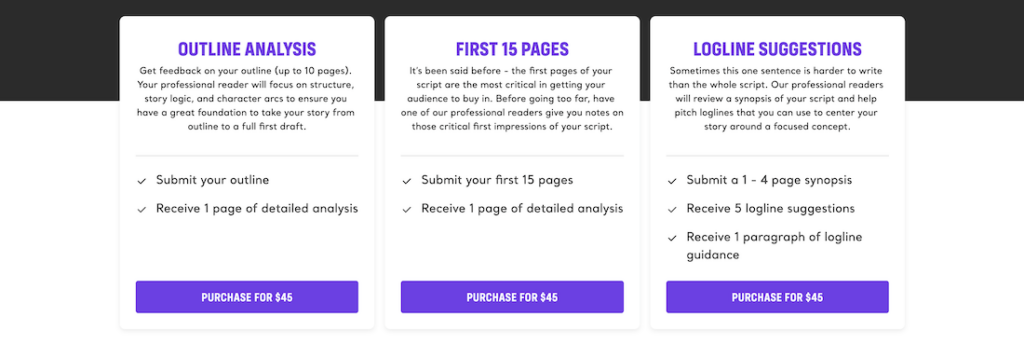Hollywood has been obsessed with intellectual property (IP) for decades. It offers executives and producers peace of mind when developing projects, knowing they have a built-in audience that could generate ticket sales and viewership. In their minds, IP offers them:
- Free Market Awareness: A pre-established fanbase guarantees instant market recognition.
- Instant Project Validation: Book/video game/article adaptations have built-in credibility
- Fanfare: Fans drum up a lot of buzz as they wait eagerly for these adaptations.
But what intellectual property, and what should (and shouldn’t) screenwriters do with it?

What Is Intellectual Property?
Intellectual property refers to creations of the mind that are legally protected. Examples of this are:
- Inventions
- Artistic works
- Symbols
- Names
- Images
- Designs
- Trade secrets
- Literary works (articles, music, lyrics, poems, novels, stage plays, teleplays and screenplays)
For writers, as soon as you create something, you own the IP rights. Registration only exists to help you prove such ownership in a court of law or binding arbitration procedures if there is a dispute between parties.
And if you want to adapt anyone else’s IP, you’re going to need to know the dos and don’ts of handling it.

The Screenwriting Dos and Don’ts of Intellectual Property
DO Adapt Studio Franchise IP for Fun
There’s nothing wrong with playing in your favorite movie franchise’s sandbox, in fact, it’s a great opportunity to experiment with established characters and worlds and learn the art of adaptation. If you ever get to the level of becoming a professional screenwriter, a majority of the paid jobs you’ll get will be writing assignments that handle IP that studios, networks and producers own.
DON’T Attempt to Profit from Studio IP
While it’s okay to adapt studio IP on your own for fun, understand that profiting from it and promoting it as yours is illegal. This includes writing it, producing it and then putting it on YouTube to generate revenue from ad views or clicks.

DO Use Studio IP to Draw Attention to Your Talent
Let’s face it, screenwriters and filmmakers need to do something to stand out and sometimes that means using studio franchise IP to get noticed.
In 2003, filmmaker Sandy Collora directed what is highly regarded as one of the best fan films ever made, Batman: Dead End, which garnered him near-legendary status among Comic-Con fans and even director Kevin Smith.
DON’T Pitch Your IP-Adapted Projects to Studios
You might have a great idea for a Star Wars, Harry Pottery or MCU movie, but unless you’re an established screenwriter, it’ll never be read. Studios and their teams of lawyers fear any lawsuits that may come their way. Even the frivolous ones. That is why it is policy to not accept or read any unsolicited emails, loglines, pitches, screenplays, or materials — especially those related to IP that they own.

Avengers Endgame (2019)
DO Understand Fair Use
Limited fair use of IP without permission for purposes such as criticism, commentary, or parody is possible. However, fair use can be a complex legal issue, so consult legal counsel if you’re unsure.
DON’T Assume Fair Use Applies
There is so much false information out there — especially in screenwriting forums and comment sections. To avoid any legal issues, don’t use anyone else’s IP.
DO Try to Find IP You Can Adapt
Make no mistake, attached IP can help your script. In most general meetings, IP is almost always brought up. Executives will ask if you have any IP-related projects — or they will have IP that they need to be adapted.
If you can nab the licensing or option the adaptation rights to comic books, novels, stage plays or any other IP, go for it. But you need to understand the limitations you’ll be facing (see below).

DON’T Pursue Unproven or High Profile IP
The old Hollywood development benchmark for a successful novel worth adapting is 50,000 copies sold (it’s likely double that now). Anything under that probably isn’t worth pitching.
Too many screenwriters believe that just having the rights to any novel means their project is more valid than others. The IP has to be successful. The only time an unproven novel is picked up for adaptation by studios or networks is when the author or subject is high-profile already.
The real secret is getting in on something early. However, it’s difficult to ascertain what will hit and what won’t. That will be the gamble you’ll be facing when trying to find IP to adapt. Yes, it’s an unfortunate Catch 22.
Read More: How to Adapt a Book for the Big Screen

DO Require a Contract Before Adapting Anyone’s IP
Whenever you partner with someone to adapt their IP, make sure you draft a contract that you both sign. Use contracts to clearly define the rights and obligations of all parties involved. Consult a lawyer or entertainment attorney to ensure your contracts are comprehensive and protective.
DON’T Assume the Contract Will Apply to Studio or Network Deals
Just because you and an IP owner agreed on profit splits doesn’t mean that agreement will apply when studios and networks are ready to make a deal.
If you agree to adapt a novel for an author and also agree to share the profits from the sale of the script, you need to understand that things can go awry for you quickly when studios and networks become involved. They could offer a side deal with the author if you haven’t been given the sole rights to adapt their work. If the contract you drafted was only for the sale of the script you wrote, the studio or network could easily buy the adaptation rights from them and hire another screenwriter.

DO Consider Using Open IP Available in the Public Domain
The Public Domain encompasses properties that are accessible for unrestricted utilization by anyone. This accessibility arises from various factors such as the expiration of copyright, the loss of copyright due to loopholes or errors, the death of the copyright owner, or the failure of the copyright owner to file for rights or extensions thereof.
What’s great about the Public Domain is that you can find iconic characters and stories and use them within your own original interpretations. Or you can adapt them outright. These are all available in the Public Domain to adapt:
- Dracula
- Frankenstein’s Monster
- The Phantom of the Opera
- King Arthur
- Robin Hood
- Sherlock Holmes
- The Wizard of Oz
- Tarzan
- Alice in Wonderland
- Peter Pan
Read More: The Hottest Public Domain Properties for Screenwriters
DON’T Use What Studios and Networks Have Already Done with Public Domain Properties
It is crucial for writers to exercise caution and restrict their focus solely to the material present in the books. Any inclusion or mention of characters and visuals from the classic film or any other subsequent adaptations could potentially lead to copyright and trademark infringement liabilities.
Read More: 101 Public Domain Story Prompts

DO Use Intellectual Property as Inspiration for Your Original Work
Anyone who says they don’t take inspiration from successful movies, franchises, and TV shows is lying. Directors, producers, and screenwriters are inspired by the work that came before them. Studios and networks are always trying to take what’s been successful and create their own version of that to jump on the bandwagon.
You can use intellectual property as inspiration for your original screenplays. And even when screenwriters and filmmakers aren’t openly using other cinematic stories as inspiration, the influence of cinema is inescapable.
DON’T Just Change the Character Names and Settings to Make the IP Yours
This is a common fear of novice and ill-informed screenwriters when sending their scripts to development executives and producers — that Hollywood will just change the character names and settings to steal your work. That’s not going to happen.
On the flip side, don’t attempt to do the same thing with someone else’s IP. It’s not only wrong ethically, but it’s illegal.
Ken Miyamoto has worked in the film industry for nearly two decades, most notably as a studio liaison for Sony Studios and then as a script reader and story analyst for Sony Pictures.
He has many studio meetings under his belt as a produced screenwriter, meeting with the likes of Sony, Dreamworks, Universal, Disney, Warner Brothers, as well as many production and management companies. He has had a previous development deal with Lionsgate, as well as multiple writing assignments, including the produced miniseries Blackout, starring Anne Heche, Sean Patrick Flanery, Billy Zane, James Brolin, Haylie Duff, Brian Bloom, Eric La Salle, and Bruce Boxleitner, the feature thriller Hunter’s Creed, and many Lifetime thrillers. Follow Ken on Twitter @KenMovies
CHECK OUT OUR PREPARATION NOTES SO YOU START YOUR STORY OFF ON THE RIGHT TRACK!
The post The Screenwriting Dos and Don’ts of Intellectual Property appeared first on ScreenCraft.
Go to Source
Author: Ken Miyamoto


